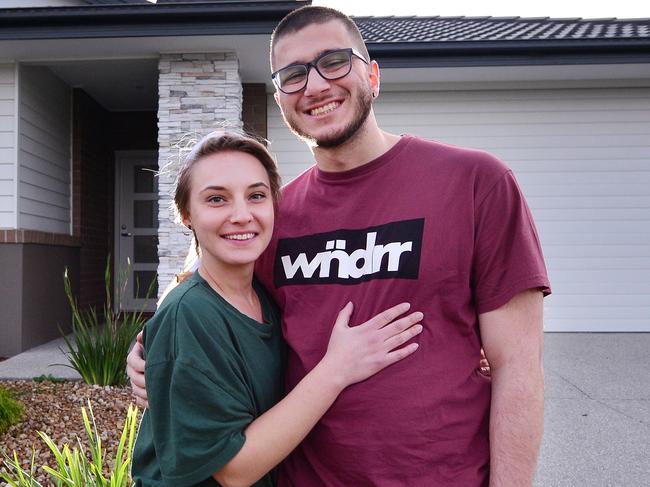Eight money habits that will leave you better off in the 2020/21 financial year
As the economic fallout from the coronavirus pandemic continues, there are some easy ways you can leave yourself better off in the new financial year.
Business
Don't miss out on the headlines from Business. Followed categories will be added to My News.
The new financial year is the perfect time to hit the reset button and form fresh money habits that will leave you better off.
While the nation is still feeling the full force of the economic fallout from the coronavirus pandemic, it’s forced many people to reassess the states of their personal finances.
Many households have experienced job losses, reduced working hours and added financial stress but experts say July 1 should be the time to establish some new money patterns for the next 12 months.
Here are eight habits to adopt.
1) DIVIDE YOUR MONEY UP
Tribeca Financial’s chief executive officer Ryan Watson said it was vital Australians divvied up their finances so they could have a more controlled handle over their cash.
“A key habit to make is structuring your cashflow for success so putting in place a banking account structure,” he said.
For example an everyday account, bills account and savings account and splitting money accordingly.
“Automating funds to go to each account will significantly increase your chances of being in charge of your cashflow,” Mr Watson said.
Also consider using bank accounts that do not make it easy to transfer money out of and quickly spend.
These are often savings accounts that can take 24 hours for the money to transfer across into a daily account and they have no card attached to them.
2) BUILD UP AN EMERGENCY FUND
Financial experts often say you should have three months worth of household expenses tucked away in case disaster strikes.
While for some this may seem unachievable, start small and build up an account that you don’t dip in and out of.
Financial comparison website Mozo’s spokeswoman Kirsty Lamont said “make regular payments into this savings account”.
“Our research shows more than half of Australians don’t have an emergency savings fund,” she said.
“Most of us don’t have enough money in the bank to last us more than a couple of weeks if we were to lose our jobs, so it’s important to set up a rainy-day fund.”

3) CRUSH CREDIT CARD DEBT
Latest Reserve Bank of Australia figures show Australians owe $41.4 billion on credit cards and $26.7 billion is accruing interest.
Many cards attract interest rates above 20 per cent.
Ms Lamont said now was the perfect opportunity to set a strategy in place to chip away and get rid of your card debt or, if you were able to, clear the balance owing every month.
“Now is the time to make a resolution to clear your card debt in full each month,” she said.
“The average credit card interest rate is sitting at 17.5 per cent which means if you are paying interest on your credit card it is hundreds of dollars a year down the drain.”
Ms Lamont said one of the best ways to clear debt each month was by setting up a direct debit and pay off the card’s balance in full before it’s due each month.
4) FOOD SAVINGS
With many of us working from home it has definitely become a lot easier to prepare meals at home, but as we return to the office this could result in us slipping back into old ways.
Tribeca Financial’s Ryan Watson said a “great habit to break is bringing your lunch into work”.
“Conservatively you could save $2400 per annum by only buying your lunch one day per week,” he said.
“Similarly, making a coffee at home before work can really put money back in your pocket across the year.”
These smaller incidental costs can quickly add up so by sticking to making hot drinks and meals at home it can quickly save a small fortune.
5) HAVE OPEN MONEY CONVERSATIONS
Getting into the habit of talking openly and honestly about your finances can prevent issues with other family members down the track.
Mr Watson said “making money conversations ‘the norm’ in the family home is a great habit”.
“We find that people are often intimidated by these discussions but when they become the norm this is where real financial learning and progress is made.”
High school teachers Patricia Kurasik, 24, and her fiance Alex Groza, 27, recently bought their first home, a four-bedroom property in Officer, in Melbourne’s southeast for $587,000.
They said they had made a plan to talk opening about handling their finances after making this big financial commitment.
“A strategy we have now is to have open conversations about finances,” Ms Kurasik said.
“We get paid fortnightly so we will be chatting about this then or at least once a month and also when we get bills coming in.”
They pair have a joint bank account which they transfer half their salary into while they also have their own personal transaction account.

6) LOOK AT SUPPORT OPTIONS
There are plenty of schemes available to Australians right now including the First Home Loan Deposit Scheme which allows eligible applicants to buy a home with a minimal deposit.
Teachers Mutual Bank’s chief executive officer Steve James urged Australians to make it a habit to look at “options of support available to help you get into the market sooner”.
“The First Home Loan Deposit Scheme allows eligible first home buyers to purchase a modest home with a deposit as little as 5 per cent without needing to pay lenders mortgage insurance,” he said.
The Federal Government secures the remaining 15 per cent of the typical 20 per cent deposit which means buyers avoid the hefty cost of lenders’ mortgage insurance.
Other new schemes includes the Federal Government’s Home Builder scheme which provides eligible owner occupiers with a grant of $25,000 to build a new home or substantially renovate an existing property.
Check the fine print first.
MORE NEWS
Property and super changes: what it means for you
Two million dip into super under early access
Stop the outrage over JobKeeper
Why superannuation rate rise will hurt Aussies
7) CHECK YOUR INTEREST RATES
The deals being offered on products including home loans have never been cheaper with some interest rates as low as 2.09 per cent.
Mr James urged borrowers to “do your research and understand the options available”.
“For some people you may prefer to choose a variable interest product which will allow you to make additional repayments to your loan with any surplus income and pay it off sooner,” he said.
“Or for others you may wish to take advantage of the low rates on offer and consider fixing.”
If you are unsure where to start, seek advice from lenders or mortgage brokers.
8) REVIEW DEALS YOU ARE ON
As boring as it sounds it’s critical you review at least once a year the charges you are paying on your regular bills including utilities and telco costs.
Pull out your latest statements and see what the monthly charges are.
Use comparison websites to compare offers and see if you are on a good deal or are getting fleeced.
Utility companies are hungry for new business so check what deals they are offering new customers and see if you can get the same. Otherwise consider switching.
Telco and home broadband costs have also continued to come down.
Again, simple saving can be made by doing a quick search online and see what other offers are available.
Originally published as Eight money habits that will leave you better off in the 2020/21 financial year

